2021年中考英语二轮专题复习课件:第七讲 非谓语动词(27张ppt)
文档属性
| 名称 | 2021年中考英语二轮专题复习课件:第七讲 非谓语动词(27张ppt) | 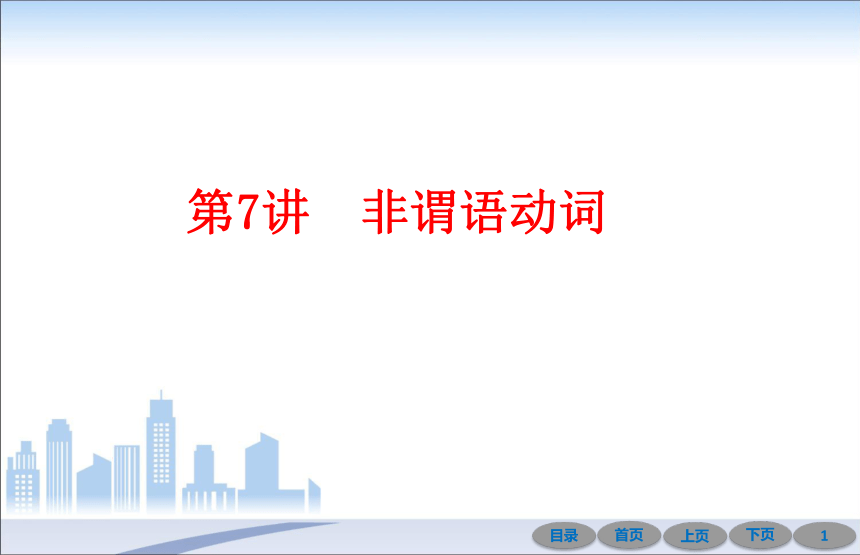 | |
| 格式 | pptx | ||
| 文件大小 | 226.5KB | ||
| 资源类型 | 教案 | ||
| 版本资源 | 人教新目标(Go for it)版 | ||
| 科目 | 英语 | ||
| 更新时间 | 2021-02-02 10:50:46 | ||
图片预览

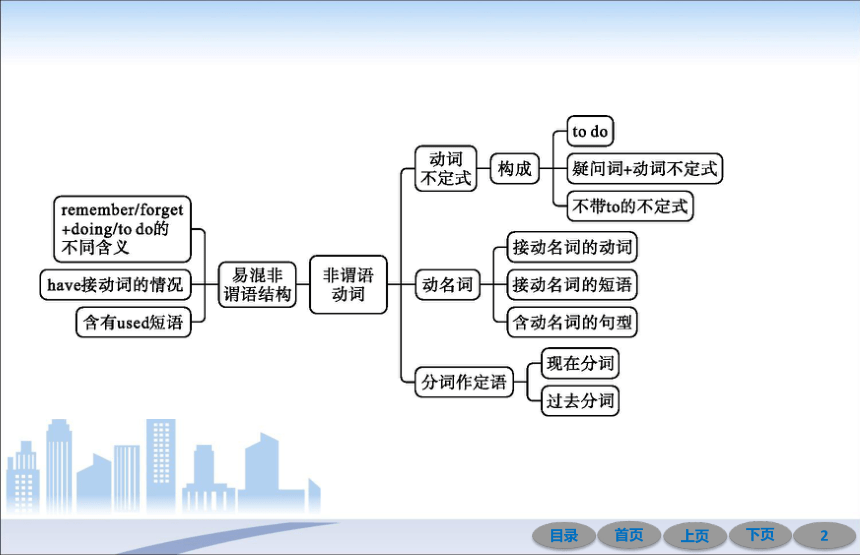
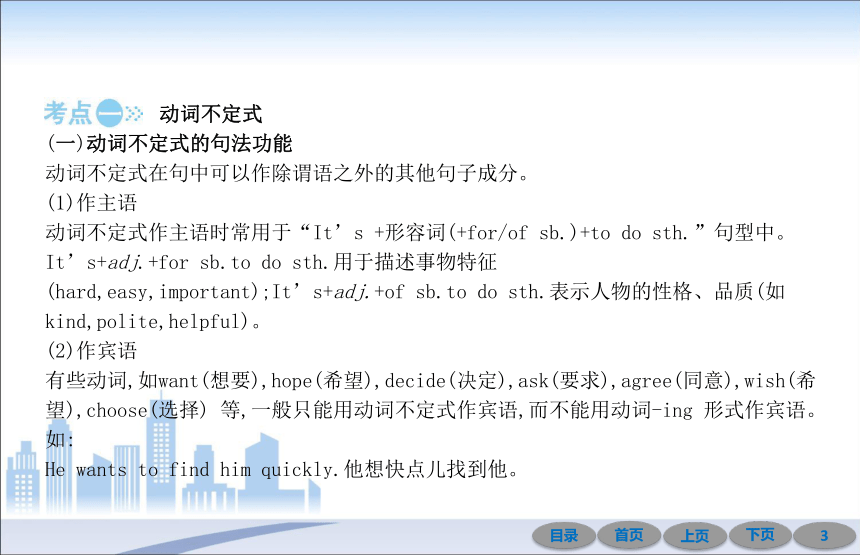
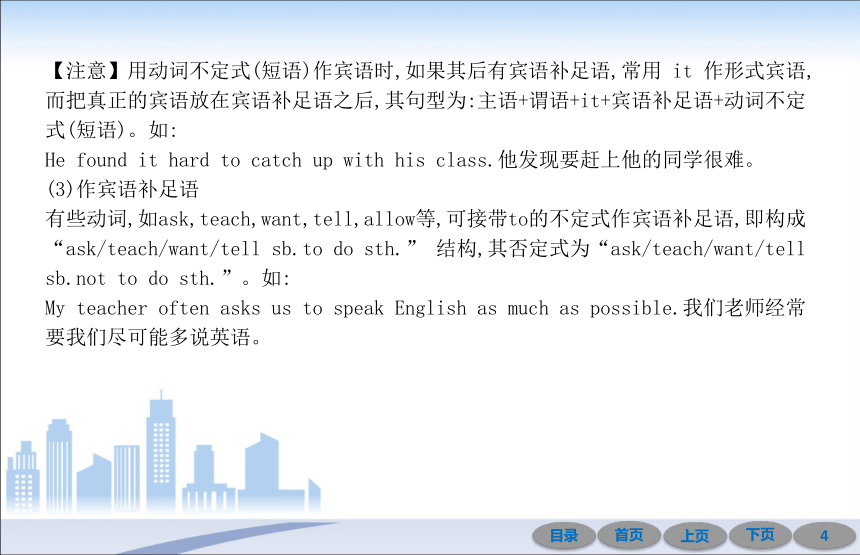
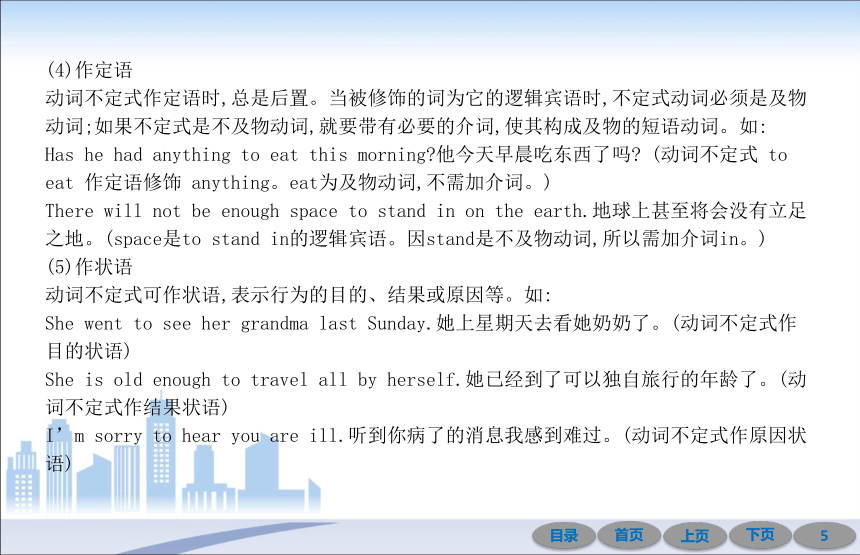

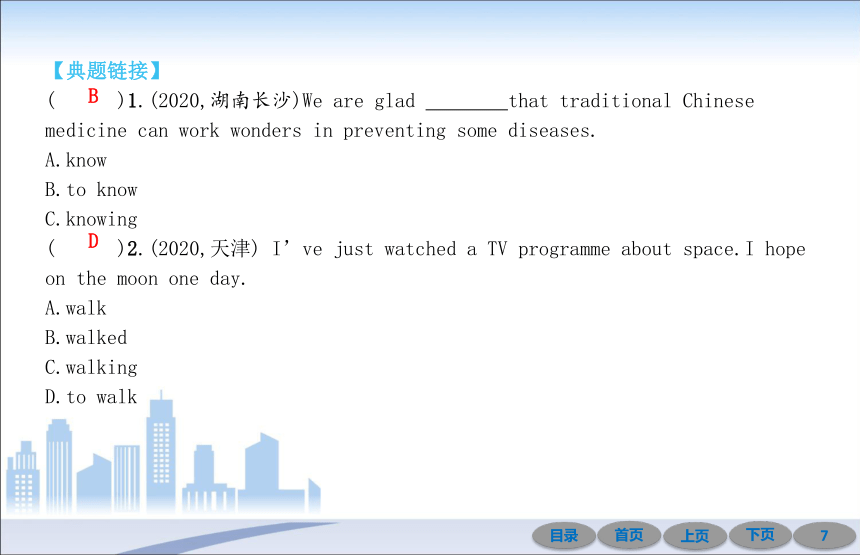
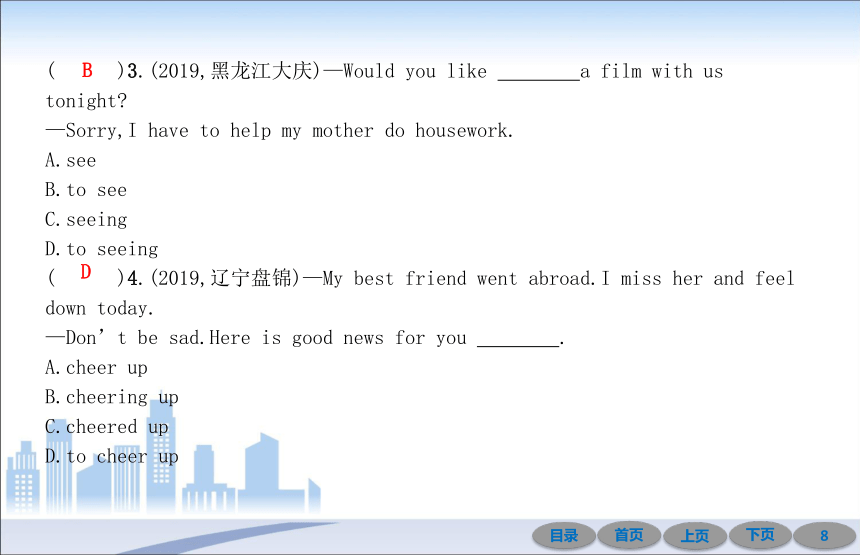
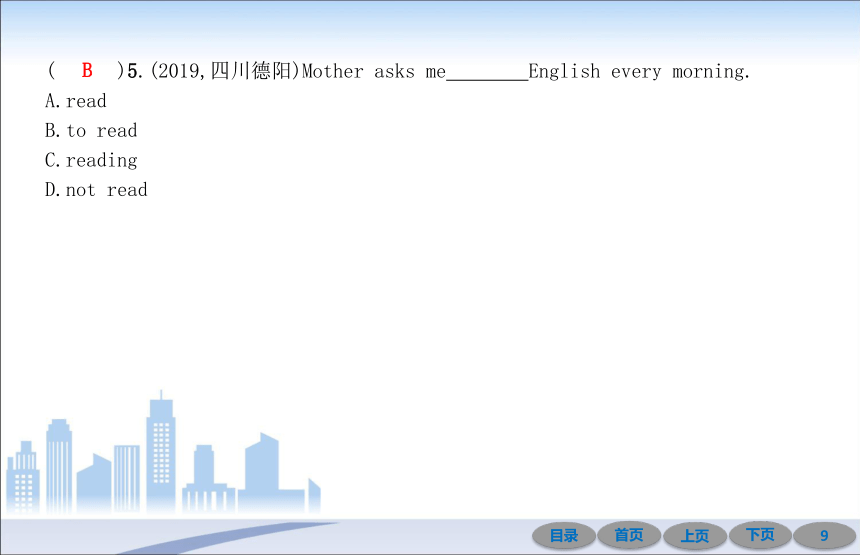
文档简介
第7讲 非谓语动词
动词不定式
(一)动词不定式的句法功能
动词不定式在句中可以作除谓语之外的其他句子成分。
(1)作主语
动词不定式作主语时常用于“It’s +形容词(+for/of sb.)+to do sth.”句型中。It’s+adj.+for sb.to do sth.用于描述事物特征(hard,easy,important);It’s+adj.+of sb.to do sth.表示人物的性格、品质(如kind,polite,helpful)。
(2)作宾语
有些动词,如want(想要),hope(希望),decide(决定),ask(要求),agree(同意),wish(希望),choose(选择) 等,一般只能用动词不定式作宾语,而不能用动词-ing 形式作宾语。如:
He wants to find him quickly.他想快点儿找到他。
【注意】用动词不定式(短语)作宾语时,如果其后有宾语补足语,常用 it 作形式宾语,而把真正的宾语放在宾语补足语之后,其句型为:主语+谓语+it+宾语补足语+动词不定式(短语)。如:
He found it hard to catch up with his class.他发现要赶上他的同学很难。
(3)作宾语补足语
有些动词,如ask,teach,want,tell,allow等,可接带to的不定式作宾语补足语,即构成“ask/teach/want/tell sb.to do sth.” 结构,其否定式为“ask/teach/want/tell sb.not to do sth.”。如:
My teacher often asks us to speak English as much as possible.我们老师经常要我们尽可能多说英语。
(4)作定语
动词不定式作定语时,总是后置。当被修饰的词为它的逻辑宾语时,不定式动词必须是及物动词;如果不定式是不及物动词,就要带有必要的介词,使其构成及物的短语动词。如:
Has he had anything to eat this morning?他今天早晨吃东西了吗? (动词不定式 to eat 作定语修饰 anything。eat为及物动词,不需加介词。)
There will not be enough space to stand in on the earth.地球上甚至将会没有立足之地。(space是to stand in的逻辑宾语。因stand是不及物动词,所以需加介词in。)
(5)作状语
动词不定式可作状语,表示行为的目的、结果或原因等。如:
She went to see her grandma last Sunday.她上星期天去看她奶奶了。(动词不定式作目的状语)
She is old enough to travel all by herself.她已经到了可以独自旅行的年龄了。(动词不定式作结果状语)
I’m sorry to hear you are ill.听到你病了的消息我感到难过。(动词不定式作原因状语)
(二)“疑问词+不定式”的用法
动词不定式可以和疑问代词(what,which等)或疑问副词(when,where,how等)连用,构成不定式复合结构,常用于tell,show,know,teach,learn,explain,remember,forget等动词后作宾语,或是在介词后作宾语。如:
I’m worrying about what to do next.我正愁接下来做什么。(不定式复合结构what to do next = what I should do next,作介词about的宾语)
(三)不带to的动词不定式结构
(1)had better do sth.最好做某事
(2)would rather do sth.rather than do sth.(prefer to do sth.rather than do sth.)宁愿做……而不愿做……
(3)Would you please do sth.?请你做某事,好吗?
(4)Why not do sth.?为什么不做某事呢?
【典题链接】
( )1.(2020,湖南长沙)We are glad that traditional Chinese medicine can work wonders in preventing some diseases.?
A.know
B.to know
C.knowing
( )2.(2020,天津) I’ve just watched a TV programme about space.I hope on the moon one day.?
A.walk
B.walked
C.walking
D.to walk
B
D
( )3.(2019,黑龙江大庆)—Would you like a film with us tonight??
—Sorry,I have to help my mother do housework.
A.see
B.to see
C.seeing
D.to seeing
( )4.(2019,辽宁盘锦)—My best friend went abroad.I miss her and feel down today.
—Don’t be sad.Here is good news for you .?
A.cheer up
B.cheering up
C.cheered up
D.to cheer up
B
D
( )5.(2019,四川德阳)Mother asks me English every morning.?
A.read
B.to read
C.reading
D.not read
B
动名词
中考主要考查动名词作宾语以及含动名词的固定结构。
(一)接动名词作宾语的动词
finish完成;practice练习;be worth值得;avoid避免;consider考虑;suggest建议;miss错过;enjoy喜欢;mind介意
(二)接动名词的短语
be busy忙于;be worth值得;can’t help禁不住;give up放弃;stop/prevent/keep...from 阻止;look forward to盼望;feel like想要;succeed in成功;devote oneself to致力于;pay attention to注意;keep on继续;stick to坚持
(三)含动名词的句型
{5940675A-B579-460E-94D1-54222C63F5DA}句型
含义
例句
prefer doing A to doing B
喜欢做A胜过做B
I prefer staying at home to going out.我宁愿待在家里也不愿外出。
spend some time/money (in) doing sth.
花费一些时间/金钱做某事
The boy spent twenty yuan buying a T-shirt.这个男孩花20元买了一件T恤衫。
thank sb.for doing sth.
感谢某人做某事
Thank you for helping me.谢谢你帮我。
Would/Do you mind doing sth.?
你介意做某事吗?
“Would you mind my coming with you?”he asked.“你介意我和你一起去吗?”他问。
How/What about doing sth.?
做某事怎么样?
What/How about having a picnic this Sunday?这个星期天去野餐怎么样?
【典题链接】
( )6.(2019,天水)Hong Kong Disneyland is well worth .?
A.to visit
B.visited
C.visit
D.visiting
( )7.(2019,湖北鄂州)—Jimmy,I don’t like my classmate Bob.He is so noisy.
—Oh,so he is.But you cannot avoid him.He sits next to you.?
A.meet
B.to meet
C.meeting
D.to meeting
D
C
( )8.(2019,广西贵港)—I have trouble the new word.Can you help me??
—Sure.You can look it up in the dictionary.
A.understanding
B.to understand
C.understand
( )9.(2019,内蒙古包头)—Why were you angry with your daughter?
—She was busy and taking selfies (自拍) when I was talking to her.?
A.texting
B.to text
C.text
D.texted
A
A
( )10.(2019,四川遂宁)These foreigners are practicing Chinese.?
A.to speak
B.speaking
C.speak
D.speaks
B
现在分词和过去分词作定语
1.现在分词作定语,表示一个正在进行的动作,它与被修饰词间存在着主动关系(即:主谓关系),常可译为“正……”。如:
The sleeping baby looks really lovely.那个酣睡的小婴儿看上去真可爱。(sleeping 表示baby正在进行的动作,是现在分词,表“主动”和“进行”)
2.过去分词作定语,表示一个已经完成的被动的动作,它与被修饰词间常存在着被动关系(即:动宾关系),常可译作 “已被”。 如果是不及物动词的过去分词,则只表完成不表被动,只译作“已”。如:
How beautiful it is! On the ground the fallen leaves are golden,and in the air the falling leaves are flying like kites.多美的景色啊! 地上的落叶金灿灿,空中飞舞的落叶像风筝。(fall为不及物动词,过去分词fallen只表“已经落下”,不表被动;其现在分词falling表“正在下落”)
3.动名词形式上与现在分词很像,都是动词的-ing形式,但动名词作定语表示被修饰词的用途,而现在分词作定语表示被修饰词的动作或特性。如:
The sitting room looks really beautiful at the moment.起居室在那时看起来的确很漂亮。(sitting 表示room的用途,是动名词)
4. “单个”分词作名词的定语时,它们常置于名词的前面(例如上边的例句);分词“短语”作名词的定语,必须放在所修饰的名词之后。如:
The man sitting under the big tree is a retired worker.坐在大树下的那个人是退休工人。(单个分词retired前置作定语,修饰worker;分词短语sitting under the big tree后置作定语,修饰man)
【典题链接】
( )11.(2020,天水) with my father’s handwriting,mine is poor.?
A.Compare
B.Compared
C.Comparing
D.Compares
( )12.(2019,四川成都)Smartphones by Huawei are getting more and more popular around the world.?
A.made
B.making
C.to make
B
A
( )13. the teacher is coming,the students stopped playing.?
A.To see
B.Seeing
C.See
( )14.Have you read a novel by Mo Yan??
A.write
B.written
C.writing
B
B
易混的含非谓语动词的结构
(一)有些动词后既可以接动词不定式作宾语,也可以接动名词形式作宾语,但所表达的意义不同,应注意区别。
{5940675A-B579-460E-94D1-54222C63F5DA}结构
含义
例句
remember/forget to do sth.
记着/忘记要去做某事
We were so busy talking that I forgot to pay.我们忙着说话,我竟然忘了付钱。
remember/forget doing sth.
记着/忘记过去做过的某事
I remember seeing you somewhere be-fore.我记得以前在哪见过你。
stop to do sth.
停下来做某事(停下来去做另一件事情)
I’m tired.Let’s stop to have a rest.我累了,咱们停下来休息一会儿吧。(讲解:停下手中的事情去休息,是两件事情)
{5940675A-B579-460E-94D1-54222C63F5DA}结构
含义
例句
stop doing sth.
停止做某事(停止手上正在做的事情)
It’s time for class.Stop talking.上课了,别说话了。
(讲解:一直讲话的同学请停下来,表示停下一直在做的事情)
try to do sth.
“努力去做某事”“尽力干……”,表示想尽一切办法要把事情办成
I’m trying to learn English well.我决心(尽力)学好英语。
try doing sth.
“尝试着干某事”“试着(用什么方法)去做某事”,表示一种试着、做做看的做法
I tried knocking at the back door,but nobody answered.我试着敲了敲后门,但没人应答。
see sb.do sth.
表示看到某人做某事了,强调已经完成的事情,或者表述客观事实
I saw her do the homework.我看到她写作业了。(强调做过这件事,表述客观事实)
see sb.doing sth.
表示看到某人正在做某事,强调正在进行,当前发生的事情
I saw her reading the book.我看到她正在读书。(强调正在进行的事情)
像see这样的感官动词有很多,比如:hear,notice,feel等,都有类似的用法。加do表示做的事情,已经完成,加doing,表示正在进行的事情。
(二)have sb.do sth.,have sb.doing sth.和have sth.done的区别
{5940675A-B579-460E-94D1-54222C63F5DA}句型
用法
例句
have sb.do sth.
意为“让某人做某事”,不定式往往表示一次性的具体动作,且强调动作已经完成或尚未发生
The soldiers had the boy stand with his back to his father.士兵让这男孩背对父亲站着。
have sb.doing sth.
意为“让某人做某事”,现在分词(doing)这种动作往往具有持续、进行的含义
The two men had their lights burning all night long.那两个人让灯通宵亮着。
have sth.done
意为“让某人做某事”,过去分词(done)这个动作由他人(非主语本身)来完成,含有“被动意义且强调动作已经完成”的意思
The driver had his car washed once a week.那个司机每周叫人洗一次车。
(三)used to do sth.,be used to do sth.,与be used to doing sth.的区别(具体用法可见本书第一篇第8讲)
【典题链接】
( )15.(2020,黑龙江大庆)—What’s next?
—I’ll have Tony you around.?
A.to show B.show
C.showed D.shown
( )16.(2019,湖南湘西)—John,remember off the lights when you leave the classroom.?
—No problem!
A.turn
B.turned
C.to turn
B
C
( )17.(2019,四川内江)—Where is Mike?
—I saw him with Mr.Smith in the hallway just now.?
A.to talk B.talking
C.talked D.talks
( )18.(2018,贵州铜仁)—Listen! Who is singing in the next room?
—It must be Sally.I often hear her there.?
A.singing B.sings
C.to sing D.sing
( )19.(2018,山东菏泽)During the Spring Festival,the young kowtow (磕头) to the elders,but now they only give them best wishes.?
A.used to give
B.were used to give
C.were used to giving
B
D
A
( )1.(2020,湖南邵阳)—When does the online class begin,Mrs.Grace?
—At eight o’clock.Tell Cindy late.?
A.not be
B.not being
C.not to be
( )2.(2020,江苏泰州)More and more teenagers have poor eyesight,so parents and teachers should take actions the situation from getting worse.?
A.stop
B.stopping
C.stopped
D.to stop
C
D
( )3.(2020,四川达州)Our government tries to do everything they can people live a better life.?
A.to help B.help
C.helping D.helped
( )4.(2020,重庆B卷)We’d better follow the seven-step hand-washing method healthy.?
A.to keep B.keep
C.keeping D.keeps
( )5.(2019,湖南益阳) ,he has to listen to tapes every day.?
A.To learn English well
B.Learn English well
C.Learning English well
A
A
A
( )6.(2018,湖南长沙)—The weather report says it’s going to have a shower this afternoon.
—It does? We’d better now,just in case.?
A.to leave
B.leaving
C.leave
( )7.(2018,重庆A卷)It was raining.My father asked me a raincoat.?
A.take
B.takes
C.to take
D.taking
C
C
( )8.(2018,山东临沂)I didn’t see you in.You must have been very quiet.?
A.comes
B.to come
C.come
D.have come
C
动词不定式
(一)动词不定式的句法功能
动词不定式在句中可以作除谓语之外的其他句子成分。
(1)作主语
动词不定式作主语时常用于“It’s +形容词(+for/of sb.)+to do sth.”句型中。It’s+adj.+for sb.to do sth.用于描述事物特征(hard,easy,important);It’s+adj.+of sb.to do sth.表示人物的性格、品质(如kind,polite,helpful)。
(2)作宾语
有些动词,如want(想要),hope(希望),decide(决定),ask(要求),agree(同意),wish(希望),choose(选择) 等,一般只能用动词不定式作宾语,而不能用动词-ing 形式作宾语。如:
He wants to find him quickly.他想快点儿找到他。
【注意】用动词不定式(短语)作宾语时,如果其后有宾语补足语,常用 it 作形式宾语,而把真正的宾语放在宾语补足语之后,其句型为:主语+谓语+it+宾语补足语+动词不定式(短语)。如:
He found it hard to catch up with his class.他发现要赶上他的同学很难。
(3)作宾语补足语
有些动词,如ask,teach,want,tell,allow等,可接带to的不定式作宾语补足语,即构成“ask/teach/want/tell sb.to do sth.” 结构,其否定式为“ask/teach/want/tell sb.not to do sth.”。如:
My teacher often asks us to speak English as much as possible.我们老师经常要我们尽可能多说英语。
(4)作定语
动词不定式作定语时,总是后置。当被修饰的词为它的逻辑宾语时,不定式动词必须是及物动词;如果不定式是不及物动词,就要带有必要的介词,使其构成及物的短语动词。如:
Has he had anything to eat this morning?他今天早晨吃东西了吗? (动词不定式 to eat 作定语修饰 anything。eat为及物动词,不需加介词。)
There will not be enough space to stand in on the earth.地球上甚至将会没有立足之地。(space是to stand in的逻辑宾语。因stand是不及物动词,所以需加介词in。)
(5)作状语
动词不定式可作状语,表示行为的目的、结果或原因等。如:
She went to see her grandma last Sunday.她上星期天去看她奶奶了。(动词不定式作目的状语)
She is old enough to travel all by herself.她已经到了可以独自旅行的年龄了。(动词不定式作结果状语)
I’m sorry to hear you are ill.听到你病了的消息我感到难过。(动词不定式作原因状语)
(二)“疑问词+不定式”的用法
动词不定式可以和疑问代词(what,which等)或疑问副词(when,where,how等)连用,构成不定式复合结构,常用于tell,show,know,teach,learn,explain,remember,forget等动词后作宾语,或是在介词后作宾语。如:
I’m worrying about what to do next.我正愁接下来做什么。(不定式复合结构what to do next = what I should do next,作介词about的宾语)
(三)不带to的动词不定式结构
(1)had better do sth.最好做某事
(2)would rather do sth.rather than do sth.(prefer to do sth.rather than do sth.)宁愿做……而不愿做……
(3)Would you please do sth.?请你做某事,好吗?
(4)Why not do sth.?为什么不做某事呢?
【典题链接】
( )1.(2020,湖南长沙)We are glad that traditional Chinese medicine can work wonders in preventing some diseases.?
A.know
B.to know
C.knowing
( )2.(2020,天津) I’ve just watched a TV programme about space.I hope on the moon one day.?
A.walk
B.walked
C.walking
D.to walk
B
D
( )3.(2019,黑龙江大庆)—Would you like a film with us tonight??
—Sorry,I have to help my mother do housework.
A.see
B.to see
C.seeing
D.to seeing
( )4.(2019,辽宁盘锦)—My best friend went abroad.I miss her and feel down today.
—Don’t be sad.Here is good news for you .?
A.cheer up
B.cheering up
C.cheered up
D.to cheer up
B
D
( )5.(2019,四川德阳)Mother asks me English every morning.?
A.read
B.to read
C.reading
D.not read
B
动名词
中考主要考查动名词作宾语以及含动名词的固定结构。
(一)接动名词作宾语的动词
finish完成;practice练习;be worth值得;avoid避免;consider考虑;suggest建议;miss错过;enjoy喜欢;mind介意
(二)接动名词的短语
be busy忙于;be worth值得;can’t help禁不住;give up放弃;stop/prevent/keep...from 阻止;look forward to盼望;feel like想要;succeed in成功;devote oneself to致力于;pay attention to注意;keep on继续;stick to坚持
(三)含动名词的句型
{5940675A-B579-460E-94D1-54222C63F5DA}句型
含义
例句
prefer doing A to doing B
喜欢做A胜过做B
I prefer staying at home to going out.我宁愿待在家里也不愿外出。
spend some time/money (in) doing sth.
花费一些时间/金钱做某事
The boy spent twenty yuan buying a T-shirt.这个男孩花20元买了一件T恤衫。
thank sb.for doing sth.
感谢某人做某事
Thank you for helping me.谢谢你帮我。
Would/Do you mind doing sth.?
你介意做某事吗?
“Would you mind my coming with you?”he asked.“你介意我和你一起去吗?”他问。
How/What about doing sth.?
做某事怎么样?
What/How about having a picnic this Sunday?这个星期天去野餐怎么样?
【典题链接】
( )6.(2019,天水)Hong Kong Disneyland is well worth .?
A.to visit
B.visited
C.visit
D.visiting
( )7.(2019,湖北鄂州)—Jimmy,I don’t like my classmate Bob.He is so noisy.
—Oh,so he is.But you cannot avoid him.He sits next to you.?
A.meet
B.to meet
C.meeting
D.to meeting
D
C
( )8.(2019,广西贵港)—I have trouble the new word.Can you help me??
—Sure.You can look it up in the dictionary.
A.understanding
B.to understand
C.understand
( )9.(2019,内蒙古包头)—Why were you angry with your daughter?
—She was busy and taking selfies (自拍) when I was talking to her.?
A.texting
B.to text
C.text
D.texted
A
A
( )10.(2019,四川遂宁)These foreigners are practicing Chinese.?
A.to speak
B.speaking
C.speak
D.speaks
B
现在分词和过去分词作定语
1.现在分词作定语,表示一个正在进行的动作,它与被修饰词间存在着主动关系(即:主谓关系),常可译为“正……”。如:
The sleeping baby looks really lovely.那个酣睡的小婴儿看上去真可爱。(sleeping 表示baby正在进行的动作,是现在分词,表“主动”和“进行”)
2.过去分词作定语,表示一个已经完成的被动的动作,它与被修饰词间常存在着被动关系(即:动宾关系),常可译作 “已被”。 如果是不及物动词的过去分词,则只表完成不表被动,只译作“已”。如:
How beautiful it is! On the ground the fallen leaves are golden,and in the air the falling leaves are flying like kites.多美的景色啊! 地上的落叶金灿灿,空中飞舞的落叶像风筝。(fall为不及物动词,过去分词fallen只表“已经落下”,不表被动;其现在分词falling表“正在下落”)
3.动名词形式上与现在分词很像,都是动词的-ing形式,但动名词作定语表示被修饰词的用途,而现在分词作定语表示被修饰词的动作或特性。如:
The sitting room looks really beautiful at the moment.起居室在那时看起来的确很漂亮。(sitting 表示room的用途,是动名词)
4. “单个”分词作名词的定语时,它们常置于名词的前面(例如上边的例句);分词“短语”作名词的定语,必须放在所修饰的名词之后。如:
The man sitting under the big tree is a retired worker.坐在大树下的那个人是退休工人。(单个分词retired前置作定语,修饰worker;分词短语sitting under the big tree后置作定语,修饰man)
【典题链接】
( )11.(2020,天水) with my father’s handwriting,mine is poor.?
A.Compare
B.Compared
C.Comparing
D.Compares
( )12.(2019,四川成都)Smartphones by Huawei are getting more and more popular around the world.?
A.made
B.making
C.to make
B
A
( )13. the teacher is coming,the students stopped playing.?
A.To see
B.Seeing
C.See
( )14.Have you read a novel by Mo Yan??
A.write
B.written
C.writing
B
B
易混的含非谓语动词的结构
(一)有些动词后既可以接动词不定式作宾语,也可以接动名词形式作宾语,但所表达的意义不同,应注意区别。
{5940675A-B579-460E-94D1-54222C63F5DA}结构
含义
例句
remember/forget to do sth.
记着/忘记要去做某事
We were so busy talking that I forgot to pay.我们忙着说话,我竟然忘了付钱。
remember/forget doing sth.
记着/忘记过去做过的某事
I remember seeing you somewhere be-fore.我记得以前在哪见过你。
stop to do sth.
停下来做某事(停下来去做另一件事情)
I’m tired.Let’s stop to have a rest.我累了,咱们停下来休息一会儿吧。(讲解:停下手中的事情去休息,是两件事情)
{5940675A-B579-460E-94D1-54222C63F5DA}结构
含义
例句
stop doing sth.
停止做某事(停止手上正在做的事情)
It’s time for class.Stop talking.上课了,别说话了。
(讲解:一直讲话的同学请停下来,表示停下一直在做的事情)
try to do sth.
“努力去做某事”“尽力干……”,表示想尽一切办法要把事情办成
I’m trying to learn English well.我决心(尽力)学好英语。
try doing sth.
“尝试着干某事”“试着(用什么方法)去做某事”,表示一种试着、做做看的做法
I tried knocking at the back door,but nobody answered.我试着敲了敲后门,但没人应答。
see sb.do sth.
表示看到某人做某事了,强调已经完成的事情,或者表述客观事实
I saw her do the homework.我看到她写作业了。(强调做过这件事,表述客观事实)
see sb.doing sth.
表示看到某人正在做某事,强调正在进行,当前发生的事情
I saw her reading the book.我看到她正在读书。(强调正在进行的事情)
像see这样的感官动词有很多,比如:hear,notice,feel等,都有类似的用法。加do表示做的事情,已经完成,加doing,表示正在进行的事情。
(二)have sb.do sth.,have sb.doing sth.和have sth.done的区别
{5940675A-B579-460E-94D1-54222C63F5DA}句型
用法
例句
have sb.do sth.
意为“让某人做某事”,不定式往往表示一次性的具体动作,且强调动作已经完成或尚未发生
The soldiers had the boy stand with his back to his father.士兵让这男孩背对父亲站着。
have sb.doing sth.
意为“让某人做某事”,现在分词(doing)这种动作往往具有持续、进行的含义
The two men had their lights burning all night long.那两个人让灯通宵亮着。
have sth.done
意为“让某人做某事”,过去分词(done)这个动作由他人(非主语本身)来完成,含有“被动意义且强调动作已经完成”的意思
The driver had his car washed once a week.那个司机每周叫人洗一次车。
(三)used to do sth.,be used to do sth.,与be used to doing sth.的区别(具体用法可见本书第一篇第8讲)
【典题链接】
( )15.(2020,黑龙江大庆)—What’s next?
—I’ll have Tony you around.?
A.to show B.show
C.showed D.shown
( )16.(2019,湖南湘西)—John,remember off the lights when you leave the classroom.?
—No problem!
A.turn
B.turned
C.to turn
B
C
( )17.(2019,四川内江)—Where is Mike?
—I saw him with Mr.Smith in the hallway just now.?
A.to talk B.talking
C.talked D.talks
( )18.(2018,贵州铜仁)—Listen! Who is singing in the next room?
—It must be Sally.I often hear her there.?
A.singing B.sings
C.to sing D.sing
( )19.(2018,山东菏泽)During the Spring Festival,the young kowtow (磕头) to the elders,but now they only give them best wishes.?
A.used to give
B.were used to give
C.were used to giving
B
D
A
( )1.(2020,湖南邵阳)—When does the online class begin,Mrs.Grace?
—At eight o’clock.Tell Cindy late.?
A.not be
B.not being
C.not to be
( )2.(2020,江苏泰州)More and more teenagers have poor eyesight,so parents and teachers should take actions the situation from getting worse.?
A.stop
B.stopping
C.stopped
D.to stop
C
D
( )3.(2020,四川达州)Our government tries to do everything they can people live a better life.?
A.to help B.help
C.helping D.helped
( )4.(2020,重庆B卷)We’d better follow the seven-step hand-washing method healthy.?
A.to keep B.keep
C.keeping D.keeps
( )5.(2019,湖南益阳) ,he has to listen to tapes every day.?
A.To learn English well
B.Learn English well
C.Learning English well
A
A
A
( )6.(2018,湖南长沙)—The weather report says it’s going to have a shower this afternoon.
—It does? We’d better now,just in case.?
A.to leave
B.leaving
C.leave
( )7.(2018,重庆A卷)It was raining.My father asked me a raincoat.?
A.take
B.takes
C.to take
D.taking
C
C
( )8.(2018,山东临沂)I didn’t see you in.You must have been very quiet.?
A.comes
B.to come
C.come
D.have come
C
同课章节目录
- 词法
- 名词
- 动词和动词短语
- 动词语态
- 动词时态
- 助动词和情态动词
- 非谓语动词
- 冠词
- 代词
- 数词和量词
- 形容词副词及其比较等级
- 介词和介词短语
- 连词和感叹词
- 构词法
- 相似、相近词比较
- 句法
- 陈述句
- 一般疑问句和否定疑问句
- 特殊疑问句及选择疑问句
- 反意疑问句
- 存在句(There be句型)
- 宾语从句
- 定语从句
- 状语从句
- 主谓一致问题
- 简单句
- 并列句
- 复合句
- 主谓一致
- 主、表语从句
- 名词性从句
- 直接引语和间接引语
- 虚拟语气
- 感叹句
- 强调句
- 倒装句
- 祈使句
- 句子的成分
- 句子的分类
- 题型专区
- 单项选择部分
- 易错题
- 完形填空
- 阅读理解
- 词汇练习
- 听说训练
- 句型转换
- 补全对话
- 短文改错
- 翻译
- 书面表达
- 任务型阅读
- 语法填空
- 其他资料
